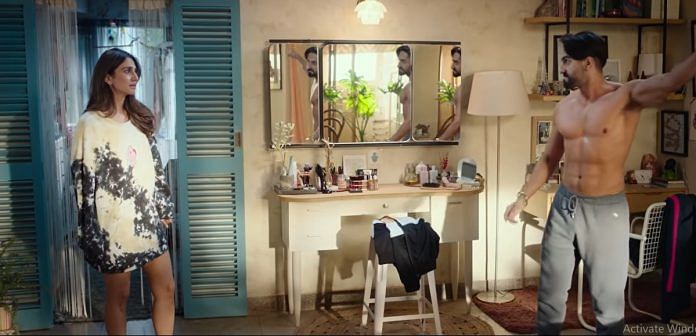A Chandigarh gabru Manu Munjal, played by Ayushmann Khurrana, falls in lust with his ‘Joomba’ instructor Maanvi Brar, Vaani Kapoor. There is nothing new in that of course, except there is. Maanvi was once Manu—a name that makes a comeback in her life with her boyfriend. Maanvi is a transwoman.
All hell breaks loose, and gaaliyan and accusations start flying the moment Manu gets to know that his beautiful, sexy girlfriend once had a penis. Because that is his horror, “Maine aadmi ke saath sex kar lia?” Full marks to Abhishek Kapoor for capturing Manu’s initial reaction to the truth and ‘horror’ straight men experience when confronted with their transphobia and homophobia.
Chandigarh hi kyun kare aashiqui?
Though this story could have been played out in any other Indian city, the director’s choice of Chandigarh stands out. Chandigarh is the next ‘big’ thing and probably the closest to Delhi with a mix of old and new, where paranthas co-exist with kitto (Keto diet), and where parents are open to ‘live-in’ but will also check the ‘qualifications’ of their son’s potential wife.
In Chandigarh Kare Aashiqui, the virility, masculinity and toxic masculinity and stereotypes of ‘gym bros’ are endless — from tight-fitted T-shirts, to a kettlebell-shaped birthday cake to endless dabbas of protein powder, and a gym called ‘Jatt Flex It’. You probably do not expect a man, who is a product of such a culture, to be able to break the shackles of gender binary and accept his own attraction for a trans woman.
And probably that is the message — if Manu Munjal can learn and unlearn, so can many of us. And this transition is packaged rather impressively. Ayushmann looks the part, from the bulk to veins to his undercut and ponytail, and the endless posters in his room of bodybuilders and motivational quotes.
In a hyper-masculine space, how does a government-school educated gym bro accept and come to terms with his own ‘horror’ of falling in love with a trans woman? How does he react to others calling Maanvi a kinnar or chhakka?
Manu Munjal’s conversation with a hijra, who earns her living begging on the streets, is a well-thought out scene. The dialogue the director has given to this character tells us perhaps the way to approach such realities — “What’s in a name? That which we call a rose, by any other name would smell as sweet” from Romeo and Juliet. Manu is willing to unlearn, and that is really what makes Chandigarh Kare Aashiqui a brave attempt.
Also read: Bob Biswas was an 8-9 min brilliant character in ‘Kahaani’. He should’ve remained there
Sab changa si, Bollywood style
For a movie trying to initiate an uncomfortable discussion, it breezes over the physicality of the trans experience in a 30-second internet clip that shows the sex change surgery. The procedure is an integral and often extremely traumatising and painful part of becoming a woman from an assigned male body. Vaani Kapoor does a commendable job, and you do empathise the pain she goes through with every rejection, once her past starts to ruin her present. The way Vanni Kapoor navigates the role, she justifies her casting but Bollywood may introspect the LGBTQ+ representation while scripting such characters.
The part Chandigarh Kare Aashiqui never talks about is the high costs involved in sex reassignment or gender affirmation surgery. Both Maanvi and Manu are wealthy, or at least their respective families here. Maanvi’s retired Army dad, played by Kanwaljit Singh, is extremely supportive. In reality, how many Indian families will extend such support? And provide for the procedure?
With money, Maanvi has one less thing to worry about. The character’s interactions are limited to people with sound financial backgrounds. The pain of surgery, or the endless medication and gender dysphoria experienced by transgenders are rarely brought to the fore.
The ‘asli mard’ trope the film relies on is dated for 2021. In 2014, an episode of Aamir Khan’s Satyamev Jayate spoke straight and clear about the concept of alternative identities. Seven years on, maybe we need to get out of the ‘safe’ ploy of serious topics served with a lot of comedy, all to ensure that no one feels too uncomfortable. It defeats the purpose and also experience of transgenders, and comes back to square one–stereotypes of mard/aurat and masculinity and femininity, and what kind of feminine a trans person should choose.



